|
|
|
Sort Order |
|
|
|
Items / Page
|
|
|
|
|
|
|
| Srl | Item |
| 1 |
ID:
173395
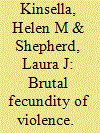

|
|
|
|
|
| Summary/Abstract |
This article highlights Marysia Zalewski's scholarship as reflective and generative of the multifarious sources and contributions of feminist IR and its ‘scavenger methodologies’, which seek to centre subjects, processes, and practices historically excluded, ignored, and minimised. The productive depth of her scholarship is evident in the uniqueness of each article in this collection, all of which distinctly document the uses to which Zalewski's writings can be uniquely put. Each of the articles performs a ‘turning operation’ of sorts on the elementals of feminist IR (gender/women/power/difference) and brings further elaborations of masculinities, sexualities, silences as well as screams, that shift and change what is taken to be feminist research/method – at each point disordering our sensibilities and our assumptions as to what we do when we do feminist work.
|
|
|
|
|
|
|
|
|
|
|
|
|
|
|
|
| 2 |
ID:
175153
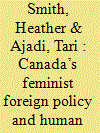

|
|
|
|
|
| Summary/Abstract |
Canadian federal governments regularly try to craft a unique image of Canada in the world; however, the Trudeau government’s embrace of feminist foreign policy feels strikingly similar to the late 1990s when human security was embraced. There seems to be a “sameness” in the promotion of a progressive values-based discourse that has transformative potential for Canadian foreign policy. The question is, does this sense of sameness bear out when we dig into the comparison? Drawing on speeches given by government ministers; policy documents, such as the Feminist International Assistance Policy (FIAP); media; and scholarship, we compare and contrast analyses of the sources of the human security and feminist foreign policy discourses and then identify common critiques. We also examine two significant differences. We find there is consistent Liberal articulation of values-based discourses and policies that have unmet transformative potential. In both cases, style and rhetoric are privileged over transformative change.
|
|
|
|
|
|
|
|
|
|
|
|
|
|
|
|
| 3 |
ID:
101270


|
|
|
|
|
| Publication |
2010.
|
| Summary/Abstract |
This article is a study of socialist feminist cultural practices in the early PRC. It investigates stories behind the scenes and treats the All-China Women's Federation's official journal Women of China as a site of feminist contention to reveal gender conflicts within the Party, diverse visions of socialist transformation, and state feminist strategies in the pursuit of women's liberation. A close examination of discrepancies between the covers and contents of the magazine explicates multiple meanings in establishing a socialist feminist visual culture that attempted to disrupt gender and class hierarchies. Special attention to state feminists' identification with and divergence from the Party's agenda illuminates a unique historical process in which a gendered democracy was enacted in the creation of a feminist cultural front when the Party was consolidating its centralizing power. The article demonstrates a prominent "gender line" in the socialist state that has been neglected in much of the scholarship on the Mao era.
|
|
|
|
|
|
|
|
|
|
|
|
|
|
|
|
| 4 |
ID:
126707
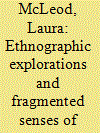

|
|
|
|
|
| Publication |
2013.
|
| Summary/Abstract |
Forum: The State of Feminist Security Studies: Continuing the Conversation. This forum comprises seven pieces conceived in response to the recent Politics & Gender Critical Perspectives section that featured contributions from Carol Cohn, Valerie Hudson, Jennifer Lobasz, Laura Sjoberg, Ann Tickner, Annick Wibben, and Lauren Wilcox (P&G 2011, Vol. 7, Issue 4). Throughout, we refer to this collection as "the CP section."
|
|
|
|
|
|
|
|
|
|
|
|
|
|
|
|
| 5 |
ID:
101606
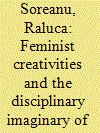

|
|
|
|
|
| Publication |
2010.
|
| Summary/Abstract |
I would like to thank Fiona Adamson, Craig Calhoun, Markus Kornprobst, Spike Peterson, Anca Simionca, Ann Snitow, Joey Sprague, Sherrill Stroschein, Christine Sylvester, and Marysia Zalewski for their engagements with the ideas presented here. I would also like to thank the referees and the editors of the journal for their constructive suggestions. A previous version of the paper was presented to the 49th Annual Convention of the International Studies Association, San Francisco, March 2008. A Visiting Fellow appointment at the Institute for Public Knowledge, New York University, allowed me the space for thought to finalize this article.
|
|
|
|
|
|
|
|
|
|
|
|
|
|
|
|
| 6 |
ID:
102741


|
|
|
|
|
| Publication |
2011.
|
| Summary/Abstract |
Feminist art is currently thriving in Israel after having come a long and curvy way. Although early twentieth century Zionism promoted gender equality in the spirit of first-wave feminism, the movement never gathered the momentum needed for it to develop into second-wave feminism. While its influence could be seen in the art of the 1970s, particularly in the United States, feminist ideology remained absent from the work of women artists in Israel. This state of affairs continued until the 1990s, when a turning point occurred. The article shows the influence of second and even third-wave feminism on Israeli women's art. It also considers the reasons for lack of a distinct category of feminist art prior to the 1990s, as well as the conditions and features of its emergence, using the case of American feminist art for comparison. The article demonstrates that although Israeli women artists were initially slow to develop a second-wave feminist ideology, it took them less than a decade to make a "quantum leap" into the next theoretical and practical stage. Within a decade and a half, Israeli women artists caught up with their colleagues overseas and are now creating cutting-edge, relevant, and contemporary feminist art.
|
|
|
|
|
|
|
|
|
|
|
|
|
|
|
|
| 7 |
ID:
163172


|
|
|
|
|
| Summary/Abstract |
In 2017, the Australian Government announced the creation of the Indo-Pacific Centre for Regional Health Security. In the same year, the Australian government investment in gender equality and empowerment in overseas development assistance reached the highest percentage ever recorded in Australian aid history. However, the health sector (excluding reproductive and family planning) has the lowest percentage of aid projects where gender equality is being mainstreamed as a primary objective. This article examines why this is the case and suggests what can be done to address the health aid sector’s gender gap. This article argues that in Australia’s largest health aid sector investment, the Indo-Pacific Centre for Health Security, there is a disconnect between the Australian government’s gender empowerment objective and its relative absence of gender inclusion policies and objectives. The solution is to prioritise gender inclusion across all health aid sector programming. Specifically, to study the lessons learned from the Australia’s gender inclusion practices in women’s health aid sector programming and to integrate them into the areas of health research and investment in emerging infectious disease outbreak response.
|
|
|
|
|
|
|
|
|
|
|
|
|
|
|
|
| 8 |
ID:
142056
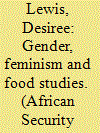

|
|
|
|
|
| Summary/Abstract |
Policy research and scholarship on food has rapidly increased in recent decades. The attention to ‘gender' within this work appears to signal important practical and academic efforts to mainstream gendered understandings of food consumption, distribution and production into expansive conceptualisations of human security. This article argues that the gender-related work on food has wide-ranging and often troubling political and theoretical foundations and implications. Often growing out of knowledge regimes for managing social crises and advancing neo-liberal solutions, much gender and food security work provides limited interventions into mainstream gender-blind work on the nexus of power struggles, food resources and globalisation. A careful analysis of knowledge production about gender and food is therefore crucial to understanding how and why feminist food studies often transcends and challenges dominant forms of scholarship and research on food security. This article's critical assessment of what food security studies in South Africa has entailed at the regional level and in global terms also focuses on the methodological and theoretical feminist interventions that can stimulate rigorous conceptual, research and practical attention to what has come to be understood as food sovereignty.
|
|
|
|
|
|
|
|
|
|
|
|
|
|
|
|
| 9 |
ID:
175478
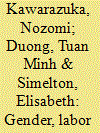

|
|
|
|
|
| Summary/Abstract |
Drawing on the narratives of women and men who have domestic or international migration experiences, this study explores the gendered impacts of migration on small-scale farming in rural Ha Tinh province in Vietnam. The paper investigates men’s and women’s migration experiences, their influence on agricultural production, and impact on their livelihoods after migration. The findings show that households use various strategies to sustain agricultural production in the absence of some members. Women’s increased economic independence through labor migration has not necessarily lead to their increased management roles in agriculture, but they are increasingly challenging stereotypical images of rural women. While migration can be a catalyst for men to transform their livelihoods, it can also widen gaps in social and economic statuses among men.
|
|
|
|
|
|
|
|
|
|
|
|
|
|
|
|
| 10 |
ID:
104039
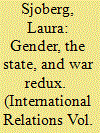

|
|
|
|
|
| Publication |
2011.
|
| Summary/Abstract |
In her recent article, 'Women, the State, and War,' in a special issue of this journal honoring Kenneth Waltz, Jean Elshtain explores the question of what if anything it does to 'put gender in' to analysis of Waltz's three 'images' of International Relations, and determines that gender is not definitive or causal in war theorizing. This article suggests that, while the question is an important and appropriate one to ask, the evidence that Elshtain brings to bear and the tools she uses to answer the question are inadequate to the task and not reflective of the current 'state of the field' of feminist International Relations. Addressing the question of if gender 'alters in significant ways' 'man, the state, and war,' this article provides theoretical and empirical examples from the young but rich field of feminist International Relations to present readers with the substance of feminist claims and the warrants behind feminist arguments. It urges International Relations to decide on the question of the relevance of gender by taking work in the area seriously, and suggests that the discipline might be convinced that acknowledging gender is crucial if scholars engage with the literature that sees 'man, the state, and war' as gendered.
|
|
|
|
|
|
|
|
|
|
|
|
|
|
|
|
| 11 |
ID:
102341


|
|
|
|
|
| Publication |
Santa Barbara, Praeger, 2010.
|
| Description |
ix, 282p.
|
| Standard Number |
9780313391439, hbk
|
|
|
|
|
|
|
|
|
|
|
|
Copies: C:1/I:0,R:0,Q:0
Circulation
| Accession# | Call# | Current Location | Status | Policy | Location |
| 055788 | 303.66/SJO 055788 | Main | On Shelf | General | |
|
|
|
|
| 12 |
ID:
131541


|
|
|
|
|
| Publication |
2014.
|
| Summary/Abstract |
Created by lawyer and psychologist William Moulton Marston, Wonder Woman first appeared more than 70 years ago, "as lovely as Aphrodite, as wise as Athena, with the speed of Mercury, and the strength of Hercules" (Marston and Peter 1941). While she conforms to traditional articulations of gender in the way she performs an attractive, female, white, heterosexual, middle-to-upper class woman, she also unsettles gendered boundaries through performing a determined, astute, formidable warrior at the same time. This has led to a number of writers exploring whether Wonder Woman can or should be viewed as feminist.
|
|
|
|
|
|
|
|
|
|
|
|
|
|
|
|
| 13 |
ID:
157604
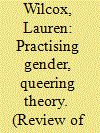

|
|
|
|
|
| Summary/Abstract |
The development of a ‘practice turn’ in International Relations promises to reconstitute IR theory around the study of embodied practices. Despite occasional references to Judith Butler’s work, the contributions of feminist and queer theory are under recognised in existing work. In this piece I note the distinctive approach to gender as a practice represented by Butler and other feminist/queer theorists for its emphasis on intelligibility and failure, particularly the importance on ‘competently’ practising gender in order to established as an intelligible subject. Given the centrality of ‘competency’ in ‘practice turn’ literature, theorising practice from the perspective of ‘gender failures’ sheds light on the embedded exclusions within this literature. To demonstrate the stakes of this critique, I discuss airport security practices, a growing area of interest to IR scholars, in terms of the experiences of trans- and gender non-conforming people. I argue that such practices ultimately complicate success/failure binaries. I conclude by considering the political stakes of practising theory in IR and how competency in theory is similarly marked by the exclusion of feminist/queer work.
|
|
|
|
|
|
|
|
|
|
|
|
|
|
|
|
| 14 |
ID:
085573
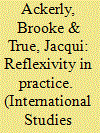

|
|
|
|
|
| Publication |
2008.
|
| Summary/Abstract |
How can we study power and identify ways to mitigate its abuse in the real world when we, as researchers, also participate in the projection of power through knowledge claims? Informing epistemological perspective, theoretical choices, research design, data collection, data analysis, exposition of findings, and venues for sharing findings, feminism offers many answers. We argue that the most important feminist tool for guiding international relations scholarship is the research ethic. This research ethic is the research practice associated with a critical feminist theory that is reflective of the normative concerns of constructivist, critical, post-modern, and post-colonial theories. It offers International Relations researchers feminist standards for assessing research despite feminism's multiplicity and its defiance of attempts to delimit its practice.
|
|
|
|
|
|
|
|
|
|
|
|
|
|
|
|
| 15 |
ID:
143308


|
|
|
|
|
| Summary/Abstract |
This article considers how, in the light of contemporary military transformations, feminist theorizing about women’s military participation might be developed to take account of an emergent reality: the inclusion of increasing numbers of women in a range of roles within armed forces. A brief overview of established debates within feminist scholarship on women’s military participation is provided, and we explore the trajectory of feminist strategies for change within both militaries and other institutions. The promise and limitations of mainstreaming gender into security institutions, as a consequence of UN Security Council Resolution 1325, are discussed. The article argues that existing feminist critiques often remain deterministic and have too readily dismissed the possibilities for change created by women’s military participation, given the context of military transformations. Drawing on the idea of the regendered military, the article presents a conceptual strategy for considering how feminist theorizing about the gender–military nexus can take seriously women’s military participation while remaining alert to feminist political goals of gender equality, peace and justice.
|
|
|
|
|
|
|
|
|
|
|
|
|
|
|
|
| 16 |
ID:
192927


|
|
|
|
|
| Summary/Abstract |
In this article, I examine one book, seven edited volumes, and twenty-four Canadian Foreign Policy course outlines to assess the inclusion of women scholars, feminist research, Indigenous scholars, and Indigenous-themed research. As we will see, the degree to which “silences have been broken” is strikingly uneven. Indigenous scholars are rare in the field and the inclusion of work by Indigenous scholars is also rare. The extent of inclusion of women scholars in edited volumes is varied, as is the representation of women scholars in readings found in course outlines. Some texts and course outlines show that the silences have been broken. However, through whose work they include, some textbooks and course outlines suggest that the work of women scholars remains marginal to the field, that Indigenous content is of little relevance, and in some cases, the work of Indigenous and female scholars is neither heard nor seen.
|
|
|
|
|
|
|
|
|
|
|
|
|
|
|
|
| 17 |
ID:
105937
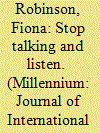

|
|
|
|
|
| Publication |
2011.
|
| Summary/Abstract |
This article seeks to extend feminist critiques of Habermasian discourse ethics in International Relations by engaging with the feminist ethics of care. Using the work of Andrew Linklater as a starting point, it argues that neither the existing critiques nor the responses have adequately addressed the key features of care ethics. The article critiques the idea of ethics as dialogue among 'human beings as equals' through an elaboration of several features of the ethics of care: firstly, the importance in care ethics of 'dependency' and 'vulnerability' not as conditions to be overcome, but rather as ways of being for normal human subjects; secondly, the focus on the responsibilities for listening attentively to the voices of others rather than on rights of individuals to be included in dialogue; thirdly, the need for patience and commitment in the recognition that responsibilities to others are fulfilled over the long, rather than the short, term; and, finally, the idea of care ethics as a substantive, democratic ethic of responsibility. These arguments emerge out of the basic ideas of care ethics - that relations and responsibilities of care are central to human life, and that care is a public value that must be negotiated at a variety of levels, from the household to the international community.
|
|
|
|
|
|
|
|
|
|
|
|
|
|
|
|
| 18 |
ID:
096300
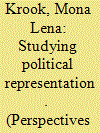

|
|
|
|
|
| Publication |
2010.
|
| Summary/Abstract |
How does a comparative politics of gender improve our understanding of political representation? I map the existing feminist literature on this topic, which asks questions like why there are so few women elected to political office, whether women in politics represent women as a group, and how the presence or absence of women in politics affects voter perceptions and opinions. I then consider how scholars-both feminist and non-feminist-might generate new insights on political representation by expanding what is thought of as a "case" and what is meant by the term "gender." I recommend increasing the scope of comparison by (1) opening up the definition of a case to include a broader range of units and events and (2) connecting the study of a single unit to patterns generated by the study of other similar units. I suggest moving away from equating women with gender by exploring (1) relations between women and men and (2) the impact of masculinities and femininities on the conduct of political life. While developed in relation to research on representation, this approach offers broader advice for capturing the diverse and gendered nature of political dynamics observed around the world.
|
|
|
|
|
|
|
|
|
|
|
|
|
|
|
|
| 19 |
ID:
192926
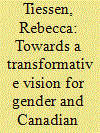

|
|
|
|
|
| Summary/Abstract |
In this paper, we consider the role of “feminist inside activists” in shaping the Canadian international policy landscape and provide examples of how government employees have actively promoted feminist and gender equality priorities. Specifically, this paper advances our understanding of how policy translates into action, and the transformative potential of agents of change in gender equality and feminist policy-making within Canada’s international policy machinery. Building on studies that identify the significant contributions of mid-level government employees who fight to keep gender equality a priority in government programming, we explore these contributions in the context of inside activism, documenting the significance of the work of both senior and mid-level government officials in advancing feminist policies and priorities. As an agency-focused analysis, this study complements and builds on critical feminist analyses of structural and systemic inequality.
|
|
|
|
|
|
|
|
|
|
|
|
|
|
|
|
| 20 |
ID:
154638
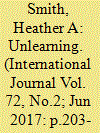

|
|
|
|
|
| Summary/Abstract |
Adopting a narrative approach, I describe how doing research on the Highway of Tears, which exposed me to Indigenous method and theory, required of me an unlearning of core assumptions about who I was as a scholar. In addition, the ongoing process of unlearning has only reinforced my view that we must be mindful about the ways in which the field of Canadian Foreign Policy (CFP) has the potential to construct images of Canada that marginalize francophone, feminist, and Indigenous voices and perspectives. We need to embrace the complexity of our country and tell stories that problematize dominant, and often simplistic, narratives.
|
|
|
|
|
|
|
|
|
|
|
|
|
|
|
|
|
|
|
|
|